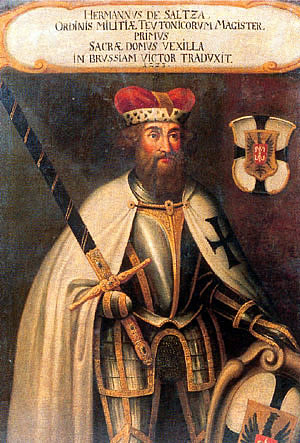A review of "The Teutonic Knights: A Military History" by William Urban.
The Teutonic Knights was a medieval order of crusaders, active in Palestine, Transylvania and the Baltic region. The order achieved its most lasting success in the latter area. For centuries, the Teutonic Knights ruled a virtual "crusader state" in Northern Europe. At its height, this state controlled Prussia, Livonia and Estonia. The knights waged crusades against the pagan populations of these regions, forcing them to adopt Catholic Christianity, either through the force of arms or through political pressure. However, their powerful state also angered the neighbouring Christian kingdoms, most notably Poland, and the popes themselves. Another formidable foe was Lithuania, originally an expansive pagan kingdom (the last in Europe) which later converted to Christianity. Allied with the Poles, the Lithuanians defeated the Teutonic Knights during the famous battle of Tannenberg in 1410. The crusader state itself did linger on for another century, but now constantly on the defensive.
The Teutonic Knights was a medieval order of crusaders, active in Palestine, Transylvania and the Baltic region. The order achieved its most lasting success in the latter area. For centuries, the Teutonic Knights ruled a virtual "crusader state" in Northern Europe. At its height, this state controlled Prussia, Livonia and Estonia. The knights waged crusades against the pagan populations of these regions, forcing them to adopt Catholic Christianity, either through the force of arms or through political pressure. However, their powerful state also angered the neighbouring Christian kingdoms, most notably Poland, and the popes themselves. Another formidable foe was Lithuania, originally an expansive pagan kingdom (the last in Europe) which later converted to Christianity. Allied with the Poles, the Lithuanians defeated the Teutonic Knights during the famous battle of Tannenberg in 1410. The crusader state itself did linger on for another century, but now constantly on the defensive.
William Urban has written a dense, confusing and at times contradictory history of these medieval braves. The book is as impenetrable as a Baltic forest. The causal reader will soon be lost among all the pagan tribes, the feudal bickering, and the detailed description of just about every knightly raid ever undertaken. Had I not read a lighter book in Swedish on the Northern Crusades, I would have been completely lost!
The most interesting chapters are about pagan Lithuania, the poetry, art and architecture of the Teutonic Knights, and the so-called Reisen, a kind of manhunts undertaken by the European nobility in the Baltic regions during the 14th century. Urban regards both sides in the pagan-Catholic conflict as equally brutal, but on balance seems to believe that the knights were at least marginally better. By defeating and converting the heathen, they at least stopped piracy on the Baltic Sea and the widespread pagan-Muslim slave-trade in the area. The attempted Polish-Lithuanian conquest of crusader-controlled Prussia after the battle of Tannenberg seems to have been a veritable orgy of rape, pillage and wanton destruction.
A disappointment was that Urban says very little about how the Teutonic Knights went to sea and conquered the island of Gotland (today part of Sweden). I've heard several different versions of that event, but the issue is only mentioned in passing in this military history, which otherwise seems almost bizarrely detailed.
"The Teutonic Knights" is probably a necessary read for hard-line medieval history buffs, but personally it made my head spin...

No comments:
Post a Comment